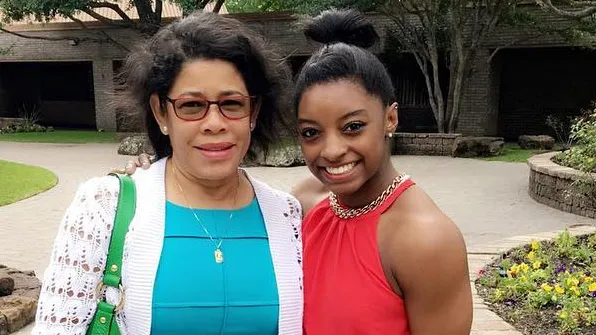
Simone Biles, the 19-year-old phenom, has secured without question the title of greatest gymnast of all time — she is the first woman in two decades to simultaneously hold world and Olympic all-around titles and the first U.S. athlete to ever do it. She is also the first woman gymnast to win three all around world championships in a row. Unfortunately, however, praise for the Texan prodigy has been tempered with insulting commentary on her family history.
Simone, who is adopted, was subjected to disrespectful comments by NBC sportscaster Al Trautwig, who found it necessary to incorrectly state that her adoptive parents were not actually her parents. Olympic viewers rightfully pushed back, but Al only doubled down on his bigoted statements. “They may be mom and dad but they are NOT her parents,” he tweeted. At this point, Simone’s own coach stepped in to defend her, replying, “Actually they are her parents.” It was only when his employer, NBC, forced his hand that he backed down, deleted the offending tweet and offered a public apology setting the record straight.
While it is remarkable that a grown man would pick on a teenager in this way, Al was by no means alone in his bias. Articles with headlines like “Little Girl Abandoned by Father and Drug-Addict Mother Is Adopted by Christian Texas Family, Becomes Best Athlete in the World,” were widely circulated in the wake of Simone’s stunning Olympic performance. In the same breath that she was deemed the world’s greatest gymnast, the racialized trauma that she and so many black families have lived with in America was flippantly rubbed in her face. The narrative of overcoming obstacles, while steeped in respectability, is not offensive on its face. What is offensive is the deliberate, insulting tone and treatment aimed at the struggles of her childhood.
Yes, Simone was in foster care. Yes, she was adopted by her biological grandparents, who became her parents. No, her exceptional skill, the fact that she has thrived in her young life, do not give you permission to demonize black people and the conditions they must live with in America. It was just a few months ago, decades after the fact, that a former aide of President Nixon admitted that the War on Drugs specifically targeted black people. When you deny black people agency over their histories of state violence, even while praising their current accomplishments, you are part of the problem. The strong implication is: we don’t see black people as human until or unless they are exceptional — and even then we insult them.
What happened to Simone recalls what happened to another young, black, athletic superstar: offensive lineman Michael Oher, whose life story and origins were depicted in the 2009 film, The Blind Side. In it, Sandra Bullock (as Leigh Anne Tuohy) “saves” the homeless teen from his drug addicted parents and a life in the projects with gangsters who drink 40s of malt liquor. Apart from the blatant white saviorism, the fictionalized depiction makes a great effort to disparage the poor black community Michael once called home. Michael, now 30, was in his early twenties when the film came out, and has since expressed that he doesn’t like the movie.
Simone, just 19 years old, clapped back at Al and the racial blind spot that allows us to insult black people for the conditions of their own oppression, by simply stating: “My parents are my parents and that’s it.”
